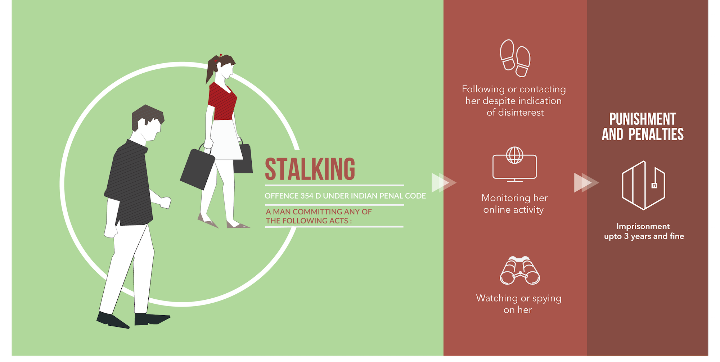
Sec 354 d
What is Cyber Stalking?
A new form of crime has taken up cyberspace wherein repetitive attempts are made by one person to contact another causing a sense of threat in the mind of such other person. Cyber stalking is a criminal offence in which the criminal uses the internet, cell, phone or other communication device to stalk another person. Online harassment and online abuse are synonymously used for cyber stalking. The criminals are usually involved in solicitation for sexual purposes, threats, destruction of data or any other form of offensive behaviour. Such actions cause emotional distress or fear of bodily harm to the victim.
Cyber stalkers are motivated by various psychological reasons like narcissism, jealousy, obsession, attraction, sexual harassment, revenge, erotomania (a belief in which the stalker assumes that the victim is in love with him), psychiatric dysfunction, internet addiction etc.

What are the legal provisions on cyberstalking?
- Indian Penal Code
Section 354D of the Indian Penal Code: This section was added by the Criminal Law Amendment Act 2013. It states that any man who follows a woman or contacts such person to foster personal interaction despite a clear indication of disinterest or whoever monitors the use by a woman of email, internet or any other form of communication or whoever spies on a person in a manner that results in a fear of violence of serious distress in the mind of such person, commits the offence of stalking. This section takes into account both physical stalking and cyber stalking.
The Section only considers women to be the victim and ignores the fact that even men can be the victim which shows that it is gender-biased legislation. Section 354 C deals with the offence of voyeurism which also comes within the purview of cyber stalking, and is discussed under Section 66E of the IT Act as well.
Section 507 of the IPC which states that whoever commits the offence of criminal intimidation by anonymous communication shall be punished with imprisonment of a term which may extend to two years. When the stalker tries to hide his identity in order to hide the source of the threat, it amounts to an offence. This ensures the basic characteristic of cyber stalking, that is, anonymous identity.
Section 292 deals with obscenity. The offence of sending obscene materials on a social networking site, or through email, messages etc. comes within the purview of cyberstalking. The stalker tries to deprave and corrupt the victim and hence will be guilty of the offence under Section 292 and shall be imprisoned for a term which may extend to five years and/or fine. However, this section does not mention obscenity through electronic forms.
Section 509 of the IPC is related to the modesty of a woman and states that whoever utters any word or makes any sound or gesture intending that such word, sound or gesture be heard or seen by a woman or intrudes upon the privacy of such woman shall be punished with an imprisonment of one year and/or fine. A stalker can be charged under this Section if the stalker makes any gesture or through words sent by email, messages or social media hinders the privacy of a woman. One of the shortcomings of this section is that the cyber-stalker can easily escape penalty as sounds cannot be heard, gestures cannot be seen and words cannot be spoken on the internet. Moreover, the intention of harming the modesty of a woman and invading her privacy cannot be assumed from communications on the internet.
- Information Technology Act, 2000
Section 67 and 67A of the Information Technology Act, 2000 is a replica of Section 292 of the IPC. The only difference is that this section relates to publishing obscene material in electronic form and thus it covers online stalking. If the stalker tries to put any obscene material about the victim on social media then he shall be guilty under this Section with imprisonment extending to three years and/ or fine. Section 67A states that the publication, transmission or causing of transmission of sexually explicit content is punishable with imprisonment extending up to five years and fine.
Section 66E of the IT Act and Section 354C of the IPC deals with the offence of voyeurism. It states that whoever knowingly captures and publishes the image of a private area of any person without his or her consent, under any circumstances, would be guilty of this offence. The stalker might hack into a person’s account and post private pictures of the victim in order to cause a sense of threat. Section 66E is more generic than Section 354C as it addresses the victim as “any person.”
Where to lodge a complaint?
Cyber-crimes do not have any barrier of jurisdiction. A cyber-crime can be reported to the cyber-crime units of any city irrespective of the place where it was committed.
- Cyber cells: Cyber cells are set up to deal with internet related criminal activity and to provide redressal to the victims of cyber-crime. If there is no cyber cell at the place of your residence then an F.I.R can be filed in the local police station. Any police station cannot refuse to register an F.I.R. irrespective of the jurisdiction. The commissioner or judicial magistrate can also be approached in extreme cases.
- Online Grievance Redressal: For victims who do not want to come out in the open can file a complaint against stalking at the National Commission for Women on www.ncw.nic.in. The commission takes up matters with the police and help in speeding up the investigation. In case of serious offences, the Commission has the authority to conduct spot inquiry, collect evidence, summon the accused and police records etc. to continue the investigation.
- Websites: Most of the social media websites like Facebook, Twitter, Instagram etc have a reporting mechanism. The victim can bring the offending content to the knowledge of the intermediary in writing or through email signed with electronic signature. They are obliged under IT (Intermediary Guidelines) Rules, 2011 to act within 36 hours and disable the offending content. The intermediary platform also has to preserve the information records for 90 days for investigation purposes.
- Indian Computer Emergency Response Team: The Indian Computer Emergency Response Team is the national nodal agency for tackling issues relating to computer threats. They issue guidelines on the procedure of reporting and response to cyber incidents among other functions.
There are some useful links to report objectionable content to Social Media Intermediaries like Facebook, Youtube, Twitter etc.
Facebook: https://www.facebook.com/policies/?ref=pf ii. https://www.facebook.com/about/privacy Ms. Ankhi Das, Facebook India, Public Policy Director Building No. 14, Raheja Mindspace, HiTech City, Main Road, Vittal Rao Nagar, Hyderabad, Andhra Pradesh, India E-mail id: records@fb.com,ankhi@fb.com and jwu@fb.com
Youtube and Google India Pvt. Ltd.: https://www.youtube.com/t/contact_us https://support.google.com/youtube/topic/2803240 ?hl=en&rd=1 Ms. Gitanjli Duggal, Legal Director, DLF Cyber City, Tower 8C. 9th floor, Gurgaon – 122002. E-mail id:support-in@google.com; gitanjli@google.com
Twitter: https://support.twitter.com/articles/80586 E-mail id: grievance-officer-in@twitter.com ; support@twitter.com
By-Mona Das
One word- just wonderful
Thank you.
Wonderful article
This article not only provide knowledge about legal provisions relating to cyber stalking but also where they can file a complaint if they face such situation.
It is a very well written article with easy and understandable language.
This Article should be read by everyone (male and female). Very useful.
Great article ?.
In our society only an women can be harassed or humiliated but it is important to understand that everyone on this plate has a proud and self respect to put. It is an dilemma that most of the time criminal use an peice of information as an object to threat and manipulate the victim. Stalking most of the time results into blackmail also and afterwards it could also be life threatening as well. Being cautious and knowing about it is the only option here not only an girl but even an male, an homosexual can harassed or stalked by anyone this can’t be denied.